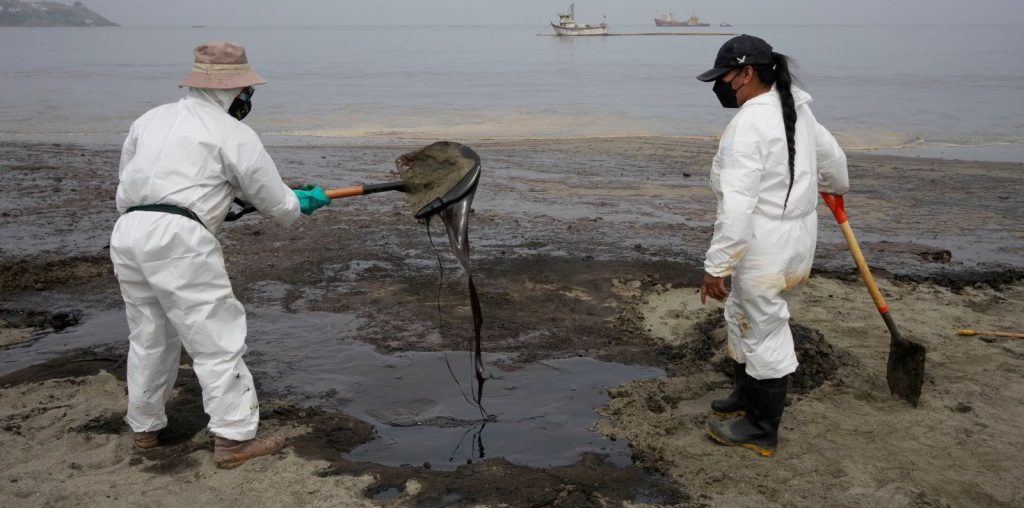A volcanic eruption in the Tonga Sea, across the Pacific Ocean, caused an oil spill in Peru on Saturday, January 15. The spill, at the maritime terminal of the La Pampilla refinery owned by the multinational Repsol, has been severely affecting the ecosystem of the coastal area near the district of Ventanilla. Repsol’s lack of foresight contributed to the effects, and the central government in Peru has been very slow to act.
At first, Repsol minimized the spill, reporting that it was equivalent to a laughable 0.16 barrels of oil — a barrel holds 160 liters — and affected a mere 2.5 square meters. The real impact, though, can be seen in the photos from the media and complaints from those who live in the surrounding area: the quantity spilled is much higher than Repsol’s initial claim.
The oil spill was produced when the tsunami-like waves generated by the volcanic eruption in the Tonga Sea caused the vessel Mare Dorium — an Italian tanker onto which oil was being loaded — to spill its contents into the water. This happened as activities along the Peruvian coast proceeded as normal after the natural disaster across the ocean; had the Peruvian Navy released adequate information, the tanker might not have capsized as a consequence of the strong waves. Further, the two people who lost their lives on the beaches of Lambayeque might still be alive today.
It took four days from the tanker capsizing before Rubén Ramirez, Peru’s Minister of the Environment reported — after meeting with company representatives — that an estimated 6,000 barrels of crude oil had spilled into the sea off Callao, directly affecting the natural ecosystems of the National Reserve System of Islands, Islotes and Puntas Guaneras, Islotes de Pescadores, and the Ancón Reserved Zone and surrounding areas.
This figure has been confirmed by the National Service of Natural Areas Protected by the State (SERNANP), which reported that the oil spilled has had a severe impact on the area’s ecosystem and that dead birds and other contaminated species have been discovered.
According to the Agency for Environmental Assessment and Enforcement (OEFA), “Repsol has two days to identify areas affected by the displacement of oil and 10 days to clean up the soil. It also has five days to contain and recover the oil that floats in the sea.”
The General Directorate of the Peruvian Coast Guard (DICAPI) stated that “the incident was quickly attended to by the company and the corresponding authorities,” which is clearly far from the truth. The facts, corroborated by newspaper reports, reveal that the company does not have a policy of fast and effective action to carry out the work of cleaning and recovery of the oil found in the sea.
The work undertaken by the municipality of Ventanilla, north of the capital Lima, is also insufficient. Mayor Pedro Espadaro’s complicit silence in not pointing out Repsol’s responsibility for not adequately reporting the amount of oil spilled leaves much to be desired. It is made worse given that he comes from the ranks of Fujimorism and, therefore, has great affinity with companies engaged in extraction and commercialization of energy resources.
The population of the affected area, along with fishermen, have been organizing protests demanding that Repsol be sanctioned and that it assume full responsibility for cleaning up the beaches. Protesters are also demanding immediate attention for the birds that survived the oil spill, and that fishermen be compensated for the damages that not only affect their basic economic activities, but also their health and that of their families.
First published in Spanish on January 19 in La Izquierda Diario.
Translation by Scott Cooper










